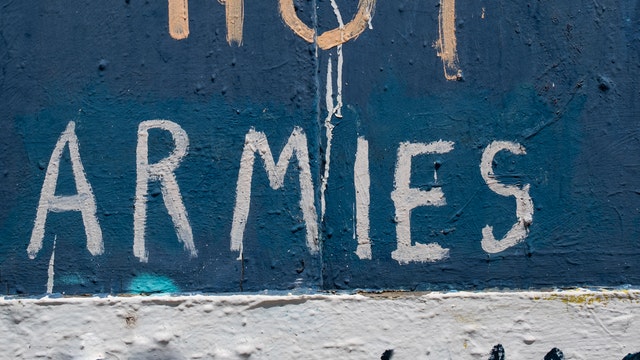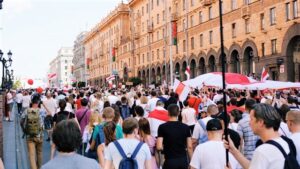
The role of the military in politics has long been discussed in political circles. Political scientists have written a lot about its nature and emergence in the power structure. A state always needs a set of institutions for its smooth functioning and to perform better for the citizens. These institutions are derived from the socio-political chores of society. But if due to some reasons, these institutions are unable to perform, a vacuum generates in the political system.
To fill this vacuum, non-political actors get activated and try to exercise their power. This is termed intervention and if it is due to the military of that country. We can term this phenomenon as military intervention.
In fact, a deliberate act of a group, officials, or organization to grab power is a clear example of intervention. So the act of grabbing power by the military of any country can be termed as military intervention.
The Military and Politics
The military forces and the political rulers who established them are supposed to be non-partisan, impartial, and unbiased in their roles. They act within the framework of the laws and rules of engagement as defined by the political rulers. Their presence has nothing to do with their personal views or interests.
They are supposed to serve and protect the country from all enemies, foreign and domestic. A battle in a country is different from a soccer game or a basketball match, and therefore the roles of the military are slightly different as well. For instance, in a soccer game, each team competes on the field with one another as a team. The conflict in Somalia was not a soccer game, but a war that should end immediately.
The Importance of the Military in Politics
The government to which the people give their sole allegiance is the supreme power in the nation or the state. The head of the government is called the president and/or the head of state. He is vested with the executive power and the armed forces are vested with the supreme powers in the military. They are the sovereigns of the land.
There is nothing in the Constitution or other law that promotes the people to lay the supreme power in the hands of any other force. Any military personnel that claims to be the authorities, to overthrow a legitimate government, are not citizens.
The military is granted the powers by the nation’s constitution. If the government is overthrown, the military forces are not ready to oust a government at all.
What is an Intervention?
An intervention is a sudden, urgent, and planned military action undertaken by a state, non-state organization, or non-state actor. It is usually taken with the intent of changing a government or changing the political direction of a country. Intervention can be done unilaterally or through a coalition of states, and its intervention can be military or non-military.
Military Intervention
Military intervention is commonly seen as an armed action by one state to alter the political course of a country or other state that it deems its enemy. Intervention can be defensive or offensive. In a defensive intervention, the state’s military forces are placed in the state’s borders in order to protect it from its enemy or from domestic resistance.
Why Are Interventions Important?
Interventions can be necessary to stop mass murder and genocide, whether done by governments or other individuals. Also, they can be made to counter threats, such as ensuring the free flow of humanitarian aid to save lives. The United Nations and other international organizations could ask member states, some of which are likely to be involved in such a genocide, to withdraw their military forces from a country.
How Are Interventions Different from Military Missions?
Military missions are military objectives, usually involving the transfer of armies on the ground, while diplomatic missions, by definition, are non-military, meant to protect other interests.
The use of force in international relations
Under the rule of international law, the only way to bring a country or an international group of nations to submit to the jurisdiction of a state is by resort to the force of arms. The force of arms means using the legitimate means available to an invading country to force the country or group of nations into complying with its demands. In some circumstances, the use of the force of arms is authorized by customary international law.
The principle of state responsibility for armed conflict states that the state that initiates an armed conflict is also responsible for its resolution.
Conclusion
The role of the military establishment in politics is well explained here. In fact, Any country, group of states, or international organizations try their best to protect its citizens against military aggression. But it all depends upon the political structure of that establishment. If political organs of any state are not so vibrant, it can invite intervention very easily.
On the other hand, if the political institutions are strong enough to protect their masses from the intervention, they can create resistance against the dictatorship. A lot of examples are there when the citizens stood up against the military and protected their democratic structure.
Turkey is the best example when in 2016 the military establishment wanted to kick out the sitting government, the reaction of the masses was strong enough to crush the military coup. Consequently, the public resistance forced the military establishment to go back into the barracks.
But this does not happen everywhere. Sudan is the recent example of another military coup, people are still out in the streets against the military coup, but the situation seems very complex.
In Myanmar, people are struggling against the military regime. The military establishment has thrown out the sitting government. All significant political leaders are under hostage or in jail. Unfortunately, the situation in Myanmar is going towards a civil war.
In order to get rid of military intervention in politics, the need for time is to strengthen the political institutions. Public awareness is the most important tool to block all such interventions in the future.



